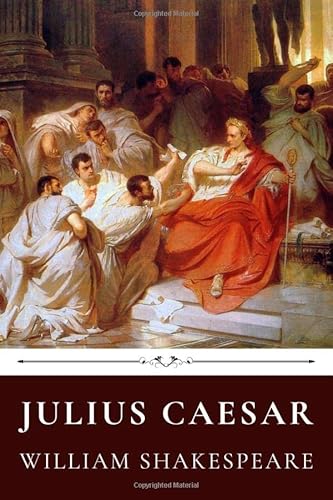Julius Caesar by William Shakespeare
William Shakespeare
BOOK REVIEW

In the grand tapestry of literary history, few works resonate with the intoxicating mixture of political intrigue, betrayal, and the aching voice of humanity as profoundly as Julius Caesar by William Shakespeare. Written at a time when England was grappling with its own versions of power struggles and the complexities of leadership, this play transcends its ancient Roman setting to speak to the hearts of anyone scrambling through the maze of ambition and ethical dilemmas. It's not merely a retelling of historical events; it is a crackling dialogue with humanity itself.
We are thrust into the chaos of Rome, a city cloaked in whispers and ambition, where the glorious rise of Julius Caesar is met with chilling envy. Shakespeare crafts characters that leap off the page, each imbued with desires that mirror our own. From the stoic Brutus, torn between his love for Caesar and the fate of Rome, to the manipulative Cassius, whose poisonous rhetoric ensnares the unsuspecting, we are drawn into a tempest of emotions that feel painfully relevant today. It's not just history; it's a mirror reflecting our struggles for power and moral clarity.
What makes Julius Caesar so riveting is how Shakespeare dares to plunge into the depths of betrayal-a theme that whispers throughout time. The iconic line, "Et tu, Brute?" hauntingly lingers, capturing the raw brutality of friendship and loyalty torn asunder. This moment of sheer soul-shattering realization isn't just Caesar's-it echoes through our lives. Can you feel it? The betrayal of a friend, a lover, or even the crushing weight of disillusionment when ideals crumble? Such is Shakespeare's genius: he drags our deepest fears and desires into the spotlight, forcing us to confront them.
Readers have found themselves both captivated and perplexed by Shakespeare's poetic craftsmanship. Some argue that the play's language, although beautiful, can be a barrier, with its intricate metaphors and historical references. Yet, such complexity is what makes it a timeless masterpiece. Critics have noted that Shakespeare melds poetic intricacy with visceral emotion, ensuring that every soliloquy resonates deeply. The passionate speeches swirl with an excitement and tremor that resonate today, as they did in the Elizabethan era. It's not merely dialogue; it's a symphony of ambition, regret, and haunting despair.
But beyond the mesmerizing prose lies an insatiable question: What does it mean to be a leader? With Caesar's fall, we explore the dire consequences of unchecked ambition and the fragility of power. The political landscape, as painted by Shakespeare, feels shockingly contemporary. Aren't we, in our own worlds, constantly grappling with the festering wounds of ambition and betrayal? As we look upon our leaders today, their soaring ideals often clad in a veneer of deceit, the moral quandaries presented in Julius Caesar become a poignant lens through which we evaluate our reality.
Fans and critics alike echo this sentiment, revealing a wide spectrum of reactions. Some see Brutus as a tragic hero, a noble figure who ultimately succumbs to the complexities of morality. Others, however, criticize him for naivety, raising debates about the very nature of virtue in politics. This multifaceted exploration fuels a passion among readers, sparking intense discussions that stretch beyond the play itself into the fabric of our democratic ideals.
As the specter of Caesar lingers, we're left not only with the aftertaste of betrayal but a pressing urgency to interrogate our own moral convictions. Shakespeare's text becomes not just a narrative but a visceral experience that aches with relevance. It compels you, yes-you-to confront the shadows of betrayal that lurk in your own relationships, your friendships, and the very foundations of your beliefs.
With Julius Caesar, Shakespeare crafts a timeless exploration of ambition, loyalty, and the price of betrayal. So, why let this moment slip by? The whispers of Rome beckon you to reflect upon the intricacies of your choices and the truths you hold dear. Every page pulses with a fiery urgency that demands you not just read but to truly feel. The next time politics raise their disheveled heads, let the lessons of Shakespeare's Rome illuminate your path, ensuring you grasp the full weight of your choices. 📜
📖 Julius Caesar by William Shakespeare
✍ by William Shakespeare
🧾 105 pages
2020
#julius #caesar #william #shakespeare #william #shakespeare #WilliamShakespeare